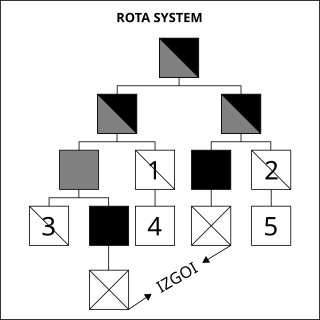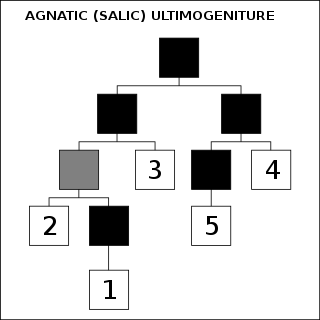 W
WInheritance is the practice of passing on private property, titles, debts, entitlements, privileges, rights, and obligations upon the death of an individual. The rules of inheritance differ among societies and have changed over time. The passing on of private property and/or debts can be done by a notary.
 W
WAdemption, or ademption by extinction, is a common law doctrine used in the law of wills to determine what happens when property bequeathed under a will is no longer in the testator's estate at the time of the testator's death. For a devise (bequest) of a specific item of property, such property is considered adeemed, and the gift fails. For example, if a will bequeathed the testator's car to a specific beneficiary, but the testator owned no car at the time of his or her death, the gift would be adeemed and the aforementioned beneficiary would receive no gift at all.
 W
WIn common-law jurisdictions, administration of an estate on death arises if the deceased is legally intestate, meaning they did not leave a will, or some assets are not disposed of by their will.
 W
WAdvancement is a common law doctrine of intestate succession that presumes that gifts given to a person's heir during that person's life are intended as an advance on what that heir would inherit upon the death of the parent. Not to be confused with an advance of someone's expected distribution from an estate currently in probate.
 W
WAgnatic seniority is a patrilineal principle of inheritance where the order of succession to the throne prefers the monarch's younger brother over the monarch's own sons. A monarch's children succeed only after the males of the elder generation have all been exhausted. Agnatic seniority essentially excludes females of the dynasty and their descendants from the succession. Contrast agnatic primogeniture, where the king's sons stand higher in succession than his brothers.
 W
WAncillary administration is "the administration of a decedent's estate in a state other than the one in which she lived, for the purpose of disposing of property she owned there." Another definition is the "administration of an estate's asset's in another state." This is often a necessary procedure in probate, because the decedent may own property in a state other than his domicile, which is subject to the law of the state in which it sits. Generally, an ancillary administration proceeding should commence in any county where the decedent’s had property. While the probate process is governed by state law, each county may have different procedures and customs.
 W
WThe Connecticut Probate Court system is a system of 54 individual probate courts located throughout the state of Connecticut. The jurisdiction of each court extends to the legal affairs of the deceased, estates, some aspects of family law, conservatorship, and several other matters requiring specific legal decisions. As statutory courts, all jurisdiction and authority is governed by the state legislature.
 W
WDisownment occurs when a parent renounces or no longer accepts a child as a family member, usually when the child does something that is perceived as unbecoming and those actions lead to serious emotional consequences. Different from giving a child up for adoption, it is a social and interpersonal act and usually takes place later in the child's life, which means that the disowned child would have to make their own arrangements for future care. Among other things, it implies no responsibility for future care, making it similar to divorce or repudiation, meaning that the disowned child would have to find another residence to call home and be cared for.
 W
WThe Estates of Deceased Persons Act 2011 is an Act of the Parliament of the United Kingdom altering the rules on inheritance in England and Wales.
 W
WForced heirship is a form of testate partible inheritance which mandates how the deceased's estate is to be disposed and which tends to guarantee an inheritance for family of the deceased.
 W
WThe Hindu Succession Act, 1956 is an Act of the Parliament of India enacted to amend and codify the law relating to intestate or unwilled succession, among Hindus, Buddhists, Jains, and Sikhs. The Act lays down a uniform and comprehensive system of inheritance and succession into one Act. The Hindu woman's limited estate is abolished by the Act. Any property possessed by a Hindu female is to be held by her absolute property and she is given full power to deal with it and dispose it of by will as she likes. Parts of this Act was amended inDec.2004 by the Hindu Succession (Amendment) Act, 2005.
 W
WIn American estate planning parlance, an incentive trust is a trust designed to encourage or discourage certain behaviors by using distributions of trust income or principal as an incentive. A typical incentive trust might encourage a beneficiary to complete a degree, enter a profession, or abstain from harmful conduct such as substance abuse. The beneficiary might be paid a certain amount of money from the trust upon graduating from college, or the trust might pay a dollar of income from the trust for every dollar the beneficiary earns.
 W
WThe Inheritance Act 1975 is an Act of the United Kingdom Parliament concerning inheritance in England and Wales. It has been amended, for example to take into account civil partnerships.
 W
WIn the law of inheritance, a laughing heir is an heir who is legally entitled to inherit the property of a person who has died, even though that heir is only distantly related to the deceased, and therefore has no personal connection or reason to feel bereaved over the death.
 W
WThis is a list of current monarchies by order of succession.
 W
WA missing heir is a person related to a decedent, or testator of a will, but whose residence, domicile, Post office, or other address is not known. A missing heir may be an orphan or other person under a disability, who may need a guardian or custodian of funds.
 W
WIn common law jurisdictions, a personal representative or legal personal representative is a person appointed by a court to administer the estate of another person. If the estate being administered is that of a deceased person, the personal representative is either an executor if the deceased person left a will or an administrator of an intestate estate. In other situations, the personal representative may be a guardian or trustee, or other position. As a fiduciary, a personal representative has the duties of loyalty, candor or honesty, and good faith. In the United States, punctilio of honor, or the highest standard of honor, is the level of scrupulousness that a fiduciary must abide by.
 W
WTraditionally, born in the purple was a category of members of royal families born during the reign of their parent. This notion was later loosely expanded to include all children born of prominent or high-ranking parents. The parents must be prominent at the time of the child's birth so that the child is always in the spotlight and destined for a prominent role in life. A child born before the parents become prominent would not be "born in the purple". This color purple came to refer to Tyrian purple, restricted by law, custom, and the expense of creating it to royalty.
 W
WProbate is the judicial process whereby a will is "proved" in a court of law and accepted as a valid public document that is the true last testament of the deceased, or whereby the estate is settled according to the laws of intestacy in the state of residence of the deceased at time of death in the absence of a legal will.
 W
WProximity of blood, or proximity by degree of kinship, is one of the ways to determine hereditary succession based on genealogy. In effect, the application of this rule is a refusal to recognize the right of representation, a component of primogeniture.
 W
WThe rota system or the lestvitsa system, from the Old Church Slavonic word for "ladder" or "staircase", was a system of collateral succession practiced (though imperfectly) in Kievan Rus' and later Appanage and early Grand Duchy of Moscow, in which the throne passed not linearly from father to son, but laterally from brother to brother and then to the eldest son of the eldest brother who had held the throne. The system was rationalised by Yaroslav the Wise, who assigned each of his sons a principality based on seniority, though it predates his reign and was also used among the Norse of Great Britain and Ireland.
 W
WThe slayer rule, in the common law of inheritance, stops a person inheriting property from a person they murder. In figuring inheritance of the decedent's estate, the slayer is treated as though they had died before the person they murdered, hence the murderer's share of the estate would pass to their issue.
 W
WA testamentary trust is a trust which arises upon the death of the testator, and which is specified in his or her will. A will may contain more than one testamentary trust, and may address all or any portion of the estate.
 W
WA trust is a legal relationship in which the holder of a right gives it to another person or entity who must keep and use it solely for another's benefit. In English common law, the party who entrusts the right is known as the "settlor", the party to whom the right is entrusted is known as the "trustee", the party for whose benefit the property is entrusted is known as the "beneficiary", and the entrusted property itself is known as the "corpus" or "trust property". With the strategic and legal use of Trusts, individuals can ensure that their children and grandchildren or chosen beneficiaries are able to benefit completely from the inheritance they want them to receive.
 W
WUltimogeniture, also known as postremogeniture or junior right, is the tradition of inheritance by the last-born of a privileged position in a parent's wealth or office. The tradition has been far rarer historically than primogeniture or partible inheritance.
 W
WThe Wills Act 1837 is an Act of the Parliament of the United Kingdom that confirms the power of every adult to dispose of their real and personal property, whether they are the outright owner or a beneficiary under a trust, by will on their death (s.3). The act extends to all testamentary dispositions or gifts, where "a person makes a disposition of his property to take effect after his decease, and which is in its own nature ambulatory and revocable during his life." As of 2012, much of it remains in force in England and Wales.
 W
WThe Wills Act 1837 is an Act of the Parliament of the United Kingdom that confirms the power of every adult to dispose of their real and personal property, whether they are the outright owner or a beneficiary under a trust, by will on their death (s.3). The act extends to all testamentary dispositions or gifts, where "a person makes a disposition of his property to take effect after his decease, and which is in its own nature ambulatory and revocable during his life." As of 2012, much of it remains in force in England and Wales.